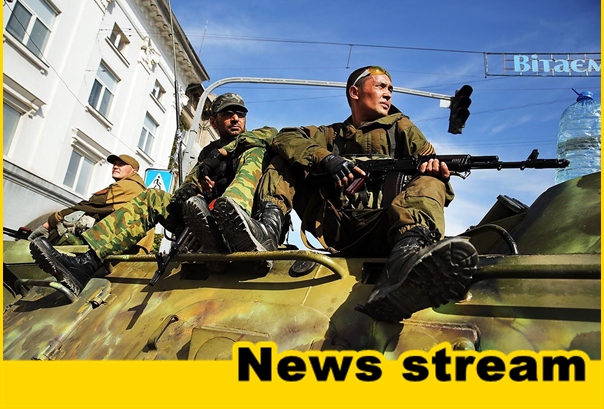
The Trump administration is slow-walking $250 million in military assistance to Ukraine, annoying lawmakers and advocates who argue the funding is critical to keeping Russia at bay.
President Donald Trump asked his national security team to review the funding program, known as the Ukraine Security Assistance Initiative, in order to ensure the money is being used in the best interest of the United States, a senior administration official told POLITICO on Wednesday.
But the delays come amid questions over Trump’s approach to Russia, after a weekend in which the president repeatedly seemed to downplay Moscow’s military intervention in Ukraine and pushed for Russia to be reinstated into the Group of Seven, an annual gathering of the world’s largest advanced economies. The review is also occurring amid a broader internal debate over whether to try and halt or cut billions of dollars in foreign aid.
United States military aid to Ukraine has long been seen as a litmus test for how strongly the American government is pushing back against Moscow.
The Trump administration in 2017 approved lethal arms sales to Ukraine, taking a step the Obama administration had never done. The move was seen as a sign that Trump’s government was taking a hard-line approach to a revanchist Vladimir Putin despite the president’s public rhetoric flattering the Russian leader. Scaling back that assistance could expose Trump to allegations that his policies are favoring Moscow.
For the 2019 fiscal year, lawmakers allocated $250 million in security aid to Ukraine, including money for weapons, training, equipment and intelligence support. Specifically, Congress set aside $50 million for weaponry.
Now, that funding is being called into question. The senior administration official, who asked to remain anonymous in order to discuss internal matters, said the president wants to ensure U.S. interests are being prioritized when it comes to foreign assistance, and is seeking assurances that other countries are “paying their fair share.” Defense Secretary Mark Esper and national security adviser John Bolton are among the officials reviewing the Ukraine security funding.
The explanation isn’t sitting well with lawmakers on Capitol Hill, where members of both parties have pushed to increase military assistance to Ukraine and U.S. military efforts to deter Russia in Eastern Europe.
There is „an at least temporary effect,“ said Rep. Tom Malinowski, a New Jersey Democrat who sits on the House Foreign Affairs Committee. „The bigger problem is that Trump is once again showing himself to be an asset to Russia.”
The funds for Ukraine can’t be spent while they’re under review and the money expires at the Sept. 30 end of the fiscal year. The account was originally created by defense policy legislation enacted in late 2015 to help Ukraine battle pro-Russian separatists in Crimea after Moscow annexed the region in 2014.
“We are aware of an [Office of Management and Budget] hold on funding for the Ukraine Security Assistance Initiative,” House Appropriations Committee spokesperson Evan Hollander said in a statement. “We have serious concerns about a freeze on these important appropriated funds, and we are urgently inquiring with the administration about why they are holding up these resources.”
The House Armed Services Committee „is aware of the restriction, but have requested additional information about what it means and is applied to,“ an aide told POLITICO.
In a POLITICO op-ed in April, Senate Armed Services Chairman Jim Inhofe (R-Okla.) called for boosting funding for the Ukraine Security Assistance Initiative and argued that a bigger portion of the money “should go to support defensive lethal aid that will make Ukraine a more difficult target for Putin’s aggression.“
The Trump administration’s broader push to freeze or slash foreign aid that White House officials perceive as wasteful has sparked intense bipartisan backlash, with lawmakers warning of a deteriorating relationship with the White House when it comes to the use of appropriated funds.
The administration dropped a plan last week amid congressional fury that would have cut more than $4 billion across 10 areas of foreign assistance, including funds for international peacekeeping operations, narcotics control and global health efforts. The administration also backed off a similar plan last year.
Rep. Hal Rogers (R-Ky.), ranking member of the House Committee that oversees funding for the State Department, and Sen. Lindsey Graham (R-S.C.), a member of the Senate Foreign Relations and Appropriations committees, both warned Trump against the package of funding cuts.
Top Republicans and Democrats on the House Foreign Affairs Committee and Senate Foreign Relations Committee also sounded the alarm.
Daniel Fried, a career diplomat who has served in both Republican and Democratic administrations and was most recently the State Department coordinator for sanctions policy, said the review sends the wrong message to a Democratic ally under intense pressure from Moscow’s aggressive behavior.
“If the Administration has a good reason for a sudden cut to security assistance to Ukraine, they should share it,“ Fried told POLITICO. „Ukraine’s new leaders, in office through free and fair elections, have earned and deserve America’s support, not mixed signals.”
Trump has also withheld hundreds of millions of dollars in aid to Central America and sought to shuffle around federal funds in order to bolster Trump’s immigration enforcement priorities.
For example, the administration plans to divert $271 million from various Department of Homeland Security accounts — including $155 million in federal disaster aid — to beef up funding for its immigration enforcement effort.
“It is of great concern that during the course of this administration, there has been a growing disconnect between the will of Congress … and the department’s immigration enforcement proceedings, which often lack justification,” Rep. Lucille Roybal-Allard (D-Calif.), who chairs the House subcommittee that funds DHS, said in a recent letter to acting Homeland Security Secretary Kevin McAleenan.
In a statement on Wednesday, a FEMA spokesperson said the move won’t affect long-term recovery efforts underway in states and territories ravaged by hurricanes, wildfires and flooding.
Natasha Bertrand contributed reporting.
Source: politico.com
See more here: news365.stream





